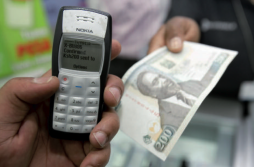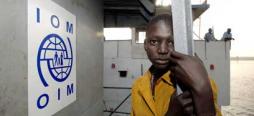mobile active
Posted by KatrinVerclas on Jun 26, 2008
MobileActive.org wants to hire you! If you are a cracker-jack researcher and writer, we want you for research and stories from around the world about mobiles for social impact. Some data entry on organizations and projects around the world using mobile phones to make the world a better place are also part of the job. Online and telephone research, interviews, writing reports and blog posts.
Must be a thorough researcher, and persuasive and clear writer. Living and working experience in developing country/ies a must. This is an ideal position for journalism graduate student with a great interest in mobile tech, or for a technologist interested in the social implications of the mobile revolution. Location in New York preferred but could be done from anywhere IF it's the right person. Fluency in Spanish or Arabic a great plus. Some travel will be supported.
Send a resume, cover letter explaining why we should hire you, and at least TWO published pieces pertaining to this or a related subject matter of at least 300-500 words. Send your materials to katrin [at] mobileactive [dot] org. Search is open until we find the perfect candidate(s), so hurry.
Posted by KatrinVerclas on Mar 20, 2007
In addition to Twitter and mobile phones as a vehicle for economic development, mainstream press and the avant garde public are fascinated with ringtones for good. It is the one topic in mobile campaigns for a cause that consistently get press and attention from mainline journalists. A case in point is the recently featured endangered species ringtones which have the press all, well -- ringing.
This from Peter Glavin's press release from the Center for Biological Diversity:
Posted by KatrinVerclas on Aug 08, 2007
Mobile phones are a vital resource in the fight against human trafficking. We hear occasionally of stories like this recent one from Kuala Lumpur, Malaysia. Malaysian police tracked down a syndicate using foreign women as sex slaves after receiving text messages from the women allegedly being held against their will.
According to the Star, "groups of gangsters in the eastern Sarawak state on Borneo island are believed to be holding women from the Philippines, Indonesia and China as prostitutes for foreign labourers working at the massive Bakun hydroelectric dam construction site in the state." One of the women obtained the mobile number of a reporter from the English daily and began sending SMS messages that the Star reported to police. A police raid resulted in the arrest of a local pimp and 10 women from Indonesia, the Philippines and China.
Meanwhile, in the Ukraine, three of the country's carriers are collaborating with the International Organization for Migration and set up a toll-free trafficking hotline. According to a report on Radio Netherlands, "customers of Ukrainian mobile phone service providers KyivStar, MTS and life:) can dial '527' from their handsets in order to receive information and advice from the IOM on migration and trafficking issues." The short code routes calls to a free IOM service providing information on the current realities facing migrants abroad including human trafficking and the consequences of irregular entry and stay in foreign countries. Migrants can also request information on legal methods of migration.
Posted by KatrinVerclas on Jul 23, 2007
Technology that has been taken for granted by people in wealthy countries is making life easier and safer for many poor in developing countries.
The rapid spread of cellular telephones in many African countries has been a remarkable and unexpected phenomenon particularly when one considers the high levels of poverty and social turmoil that occurs in many of these countries. Last year the Enterprise Africa! team visited Botswana in order to document the poverty alleviating aspects of the cellular telephone. Technology that has long been taken for granted by people in wealthy countries is making life easier, safer, and more prosperous for many, including the poor in developing countries. A result of the rapid diffusion of this technology is the creation of a vast number of jobs and enterprises, enabling many Africans to escape the poverty trap.
The most obvious benefit of cellular telephones is that they provide access to communication where none existed before. Families in remote areas, and farmers and businesses that could not afford or even obtain fixed lines, are now able to talk with loved ones, receive orders, schedule deliveries, and make appointments. Mobile phones were an immediate success, even in areas that already had access to landlines, because in addition to connectivity they offered services like itemised billing, prepaid or contract options, and other value-added services.
Posted by KatrinVerclas on Jul 22, 2007
Sexual education is entering the mobile age. In Singapore, famous "Dr Love" offer answers to sex-related questions to the predominatly Muslim population via mobile phone. Half-way around the world, SexInfo doles out sexual health info to teens in 160 characters on the Unites States West Coast, and similar services operate in London and in Australia.
In Singapore, according to the Age:
Indonesians are invited to send a text message with any sex-related question to a panel of volunteer local doctors who will either send them a message back or use their question to help compile information on a website.
The brains behind the idea, Wei Siang Yu, who is nicknamed "Dr. Love" for his flamboyant methods of teaching Singaporeans about sex, told a press briefing his scheme would turn conventional sex education on its head.
Posted by KatrinVerclas on Jul 07, 2007
LiveEarth, the global music event taking place today, is launching one of the most ambitious mobile campaigns in its effort to organize people worldwide on climate change.
Live Earth is broadcast to more than two billion people with concerts in New York, London, Sydney, Tokyo, Shanghai, Rio de Janeiro, Johannesburg, and Hamburg.
Concert goers and those watching online and on television in four countries will be able to 'answer the call' via sms by texting in a key word in one of six issue areas, pledging to change their behavior to save the earth from climate destruction. Keywords such as home, job, shop, ride, share, and lead can be texted in to short code 82004 in the Unites States and UK, to 70707 in Germany, and 199 66 777 in Australia.
Posted by KatrinVerclas on May 18, 2007
We are pleased that there is a growing body of academic research on the use of mobile phones in civil society. While primarily focused on mobiles as a tool for economic development (references), we are learning of a few that are explicitly focused on mobiles in activism.
Redante Asuncion-Reed just published his Master's on the use of cell phones in activism focusing on a Fahamu, an African-based organization active in the MobileActive Network. You can download it here.
He writes:
Posted by kiwanja on Aug 17, 2006
Citizen journalism has been hitting the news lately, accelerated by the use of mobiles and blogging during the latest events in the Middle East. Something which has been around for some time is starting to become more and more mainstream by the day. Sadly, most seems to be centred around world trouble spots, but therein lies it's strength.
Posted by cspence on Jun 07, 2006
On May 21 the National Democratic Institute (NDI) provided technical assistance to a Montegrin NGO called the Center for Democratic Transition (CDT) that successfully monitored their country's independence referendum using SMS as the primary observer reporting tool. We believe this is the first time an election monitoring group has employed text messaging to meet all election day reporting requirements. Details about the program follow.
General Information:
- Election monitors from the Center for Democratic Transition (CDT) in Montenegro conducted the first ever election monitoring project where SMS was used as the primary tool for reporting election information with NDI technical assistance.
- 200 observers reported approximately 11 times each throughout the day including voter turnout and results data, transferring over 2000 reports to the reporting center in Podgorica. All reports were automatically entered into the reporting database where they were immediately included in analysis reports.
Turnout
Posted by kiwanja on Apr 27, 2006
I recently made a presentation at a Conference hosted by Technologies for Conservation and Development (t4cd) at Microsoft's Research Centre in Cambridge, UK.
The Conference, which I helped organise through my work with the lead project partner - Fauna & Flora International - brought technologists and conservationists together to try and join the dots in this 'mini digital divide'. My talk was on the growing use of text messaging within the conservation and development communities, and more generally in wider society.
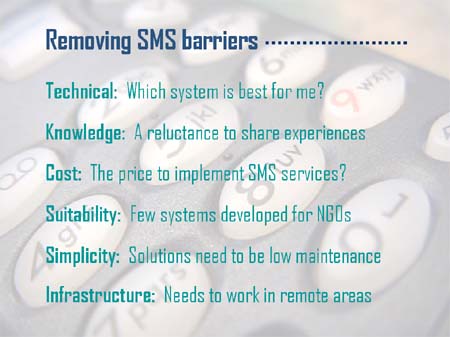
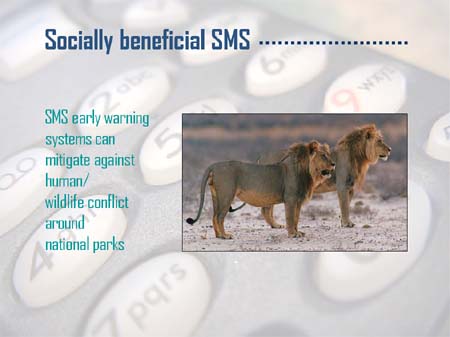
Posted by KatrinVerclas on Mar 15, 2006
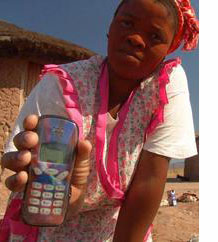 Great article in the UK Times about the mobile market in Africa and the enormous growth there.
Great article in the UK Times about the mobile market in Africa and the enormous growth there.
"This remarkable growth — the African market is expanding nearly twice as fast as Asia’s — has confounded analysts and even service operators. As recently as 2003, the International Telecommunications Union (ITU) forecast that there would be only 67 million users by the end of 2005.
“Many of us underestimated the strength of the informal sector in Africa,” said Michael Joseph, chief executive officer of Safaricom, Kenya’s biggest operator, with four million customers. “And the huge need and desire for people to communicate.”
